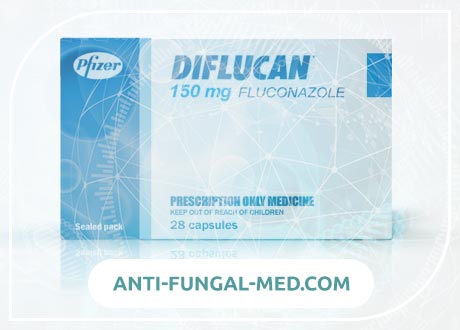
Diflucan
Diflucan also referred to as Flucanazole is an antifungal medication that is usually administered in form of tablets as well as oral suspension. It is prescribed as a treatment for serious fungal and yeast infections.
It is from a new subclass of synthetic triazole available as a white crystalline that dissolves in water and saline. It has a number of inactive ingredients which include calcium phosphate, aluminium lake dye, microsrystalline cellulose which is responsible for its crystalline form as well as Fluconazole which is in doses of 50,100, 150 and 200 milligrams.

Diflucan prevents the growth of fungi by limiting the growth of membranes that surround fungal cells.
Uses Of Diflucan
Diflucan is used as treatment for the following;
- Oropharyngeal candidiasis
- Esophageal candidiasis
- Cryptococcal meningitis
This treatment has also been found to be effective off urinary tract infections and pneumonia. It also lowers the chances of candidiasis in patients who have gone through bone marrow transplant and are receiving radiation therapy. In such instances, specimens should be obtained before the patient starts therapy so as to identify and alienate the causative organisms. The patient can then proceed with theraphy as they await the results. Once available, their anti-infective therapy should be tuned in line with the outcome of the tests.
How to use Diflucan
It is advisable to read all the information provided on the leaflet that has been provided by your pharmacist before you begin taking Diflucan mediaction. You should also ask for a written prescription everytime you go for a refill. You should always ask your doctor or pharmacist if you have any questions on dosage and usage.
This medication may be administered differently depending on the reason for treatment, however, always take medication orally with food or without food as advised by your physician.
You should always shake the bottle well before taking Diflucan oral suspension. Measure the dosage using the provided meausing tool. Please do not use a kitchen spoon as you may not be able to get the accurate measurements of the dosage prescribed. The dosage may vary depending on your medical condition as well as how your body responds to treatment. As for children, dosages are based on the weight of the child. In general, doses administered to children should not be more than 600 milligrams daily unless otherwise directed by your doctor. Most doctors would prescribe a maximum of 400 milligrams. Always follow instructions when making the oral suspension mix. Take Diflucan with a full glass of water.
Diflucan works best when the amount of Diflucan in your blood is maintained at a constant level . It is therefore important that you stick to the timelines provided for you to take the medication everyday till the prescribed dosage is complete.
You should not share Diflucan with anyone else or prescribe it to a family without proper consultation by a trained doctor. In case of an overdose, you should contact the poison control centre immediately.
Always inform your doctor if the symptoms persist.
Side Effects of Diflucan
You should seek help immediately if you experience any allergies after taking Diflucan. This could include difficulty breathing, swelling of the face, lips, tongue, throat and hives.
If the side effects are serious then call your doctor immediately or visit the nearest health facility for assistance.
Other alarming side effects to watch out for include; nausea, fever, chills, loss of appetite, dark urine, jaundice which is characterized by yellowing of the eyes and skin, upper stomach pain, itching, blistering or appearance of reddish rash, weakness, bruising and bleeding and convulsions.
Other side effects to watch out for include mild stomach pain, diarrhea, headache, dizziness, unpleasant taste in your mouth and lastly stomach upsets. It is important to note that you should note use this mediaction if you are allergic to fluconazole or similar drugs. Other drugs in this class include econazole also known as Spectazole, sulconazole also known as Exelderm, terconazole also known as Terazol, tioconazol also known as Vagistat-1 and voriconazole also known as V-fend.
You should avoid taking Diflucan alongside other medications such as cisapride also referred to as Propulsid. Always inform your doctor of all other medications that you are taking in order for them to advise you appropriately.
It is also important to note that you should inform your doctor if you have liver disease, kidney disease, heart rhythm disorder or if you have a long QT syndrome. Always complete the prescribed doses as symptoms may clear as soon as you start taking this medication. If you stop or skip doses before the end of the period you have been advised then you risk developing resistance to antifungal medication in future. You should always get checked regularly while under this medication. Please note Diflucan is only prescribed for fungal infections and cannot therefore be used as treatment for viral infections such as Flu or common cold.
Precautions and Directions
Pregnancy
There haven’t been in-depth researches conducted on pregnant women to determine the effects of Diflucan on pregnant women. There have been no indications of increased risk on the fetus or anomalies following a single maternal dose of 150mg. Reports that have been published previously show that there was a disticnct pattern of anomalies on infants who had been exposed to Diflucan while still in the uterus. This drug should therefore not be administered to patients during pregnancy and if they get pregnant while on medication then they should stop immediately. These reports were similar to the results from animal studies. Diflucan is especially dangerous to pregnant women if taken during the first trimester. Features in infants that pointed towards this drug being a danger to pregnant women included brachycephaly, arthrogryposis, congenital heart disease and thin ribs and long bones.
Nursing Mothers
In nursing mothers, diflucan is secreted in milk in the same concentations as in the maternal plasma. Nursing mothers are therefore advised to be cautious while taking this medication. It should be approved by a doctor and paeditrician.
Pediatric Use
For children, Diflucan can be used in treatment of Oropharyngeal candidiasis especially for children between the ages of 6months and 13 years of age.
Single Dose
A single dose of Diflucan administered for treatment of vaginal yeast infections should be compared against the acceptability of a higher chance of severe effects on the patient i.e 26 percent Diflucan versus 16 percent intravaginal agents as was reported in comparative studies.
Carcinogenesis, Mutagenesis, And Impairment Of Fertility
Diflucan was not reported to affect the fertility of male and female animal samples which were tested orally with doses of 5, 10 or 20 milligrams. The start of parturition was however delayed at 20mg for every kg. An intravenous perinatal study in rats at 5, 20 and 40mg/kg showed cases of dystosia and a prolonged parturition which was reflected by a slight increase in the numbers of still borns and a reduced number of neonatal survivors at these dosages. In humans, however, diflucan has not been proven to cause infertility.
Children
There have been no paediatric concerns on children using Diflucan.
Elderly
For the elderly diflucan dosages should be adjusted depending on renal function.
Renal Impairment
Diflucan is usually passed out in urine as an unchanged active substance. It is not necessary to adjust the dosages for patients with renal impairment. An initial dose of 50mg to 400mg should be administered as per the recommended daily dosage .
Use & Storage
You should keep all medicines out of reach of children. Once outdated or if it is no longer in use, you should return to a professional health care professional for proper disposal. You should store these medicines in a closed container at room temperature. Keep away from heat, direct light and do not freeze. The already mixed oral suspension should be stored in the fridge or at room temperature and should be used within 14 days. As in all medications, the consumption of medicine should be preceeded by a decision that the good outweighs the side effects. Your doctor will be able to advise appropriately on this.
After continued use of this medication, consult a doctor if symptoms persist.
Anti-Fungal Medication
Anti-fungal medication is used to treat fungal infections common on your skin, nails and hair. Although it is quite straightforward to treat fungal infections, the length of treatment depends on the type of infection and whether the patient has any other health issues. Patients with problems with their immune system may cause major delays in response to anti-fungal medication. There are also short treatments such as for vaginal thrush and long ones up to eight weeks such as treatment for ringworm infections on the scalp.

Anti-fungal medicines are available over the counter but having a prescription from your doctor is crucial. Common infections include; ringworms, athlete’s foot, nail infections, vaginal thrush and some severe dandruff. Other serious fungal infections develop inside the body tissues and need the doctor’s keen attention. They include; aspergillosis in the lungs, and fungal meningitis in the brain.
How does Anti-Fungal Medication Work?
Most of the anti-fungal medicines are designed to damage the cell wall of the fungus to kill the fungal cell. The contents of the fungal cells leak out of the broken wall exposing the cells. Other drugs inhibit growth and reproduction of the fungal cells.
Types of Anti-Fungal Medicines
Intravenous antifungals come as an injection to your vein while topical antifungals include creams, ointment, gels, and sprays. They are applicable directly to the skin hair or nails with the infection. Oral antifungals include capsules, tablets, or liquid medicine for swallowing. Intravaginal antifungal pessaries are small, soft tablets designed for insertion into the vagina to treat thrush.
Common medicines include clotrimazole, miconazole, fluconazole, econazole, amphotericin, and ketoconazole.
Things to Consider
Before consuming or applying any antifungal medicines, consult a pharmacist or ask your doctor for information. One of the main issues you need to know is whether you have an existing condition or allergy that may cause a reaction to treatment. Find out about the side effects of the medicine you intend to use. You also need to know the interaction properties of the medicine with other drugs you are already using. You should not use drugs that will interact too strongly to affect your health. Finally, find out whether the medicine will be suitable to take during pregnancy or while breast-feeding since many of them are not recommended.
Find information about the suitability of the drug from a reliable professional source. Avoid myths and rumors.
Side effects
Antifungal medicines are responsible for some mild short-term side effects. It would be important, nevertheless, to know them so you will not be caught by surprise. Common side-effects are; itching or a burning feeling, skin redness, general feeling of sickness, abdominal pain, rashes or diarrhea. Severe reactions to the medicines include allergies, skin over-reaction and liver damage.
Allergies may appear as a swelling on your face, neck or tongue and may cause difficulty in breathing. Severe skin reactions, on the other hand, cause peeling and blisters. In rare isolated cases, one may experience liver damage through excessive vomiting, loss of appetite, dark urine, pale faeces, and excessive tiredness.
If you experience such extreme cases, stop using the medicine immediately and seek medical attention in a doctor or a pharmacist. You should change your medicine. In occasions when you find difficulty in breathing, take quick measures such as calling and ambulance or visiting the emergency department of your nearest hospital.
The Yellow Card scheme is also an option for reporting medical reactions. It is run by a safety watchdog that is dedicated to ensure the safety of drugs.
Children
There are some antifungal medicines that suitable for children and even babies. Miconazole oral gel is a good example that is used to treat oral thrush in babies. The dosage however, is different for children with different ages, consult a pharmacist or doctor to get the most appropriate fitting dosage for your babies.
Care
When using topical antifungals that are applied on the skin, avoid contact with your eyes and moist linings. Moist linings include the mucus membranes so unless the gel is meant to go inside your nose, avoid contact with your nose and mouth.
While using antifungals to treat vaginal thrush, take note to change the method of contraception. You may not use condoms, for example because they will be damaged. Hormonal contraceptives may also react with some types of antifungal medicines. In such a case, you may experience bleeding but the contraceptive will not be affected.
Interactions
While on medication, it will be important to find out the interaction of combining these medicines. Some of the common medicines that interact with antifungals include; benzodiazepines which help with sleep to reduce anxiety, ciclosporin which suppresses the immune system and cimetidine which treats indigestion. Others include estrogens fond in some contraceptives, phenytoin that treats epilepsy and rifampicin which treats tuberculosis.
Antifungals also interact with zidovudine that treats HIV, theophylline for asthma, and phenytoin for epilepsy.
In conclusion, seek medical advice before proceeding to use any of the medicines for fungal infections. Stop and consult your doctor whenever you have unusual reactions from the medicine to determine the course of action.
 DE
DE FR
FR IT
IT ES
ES




